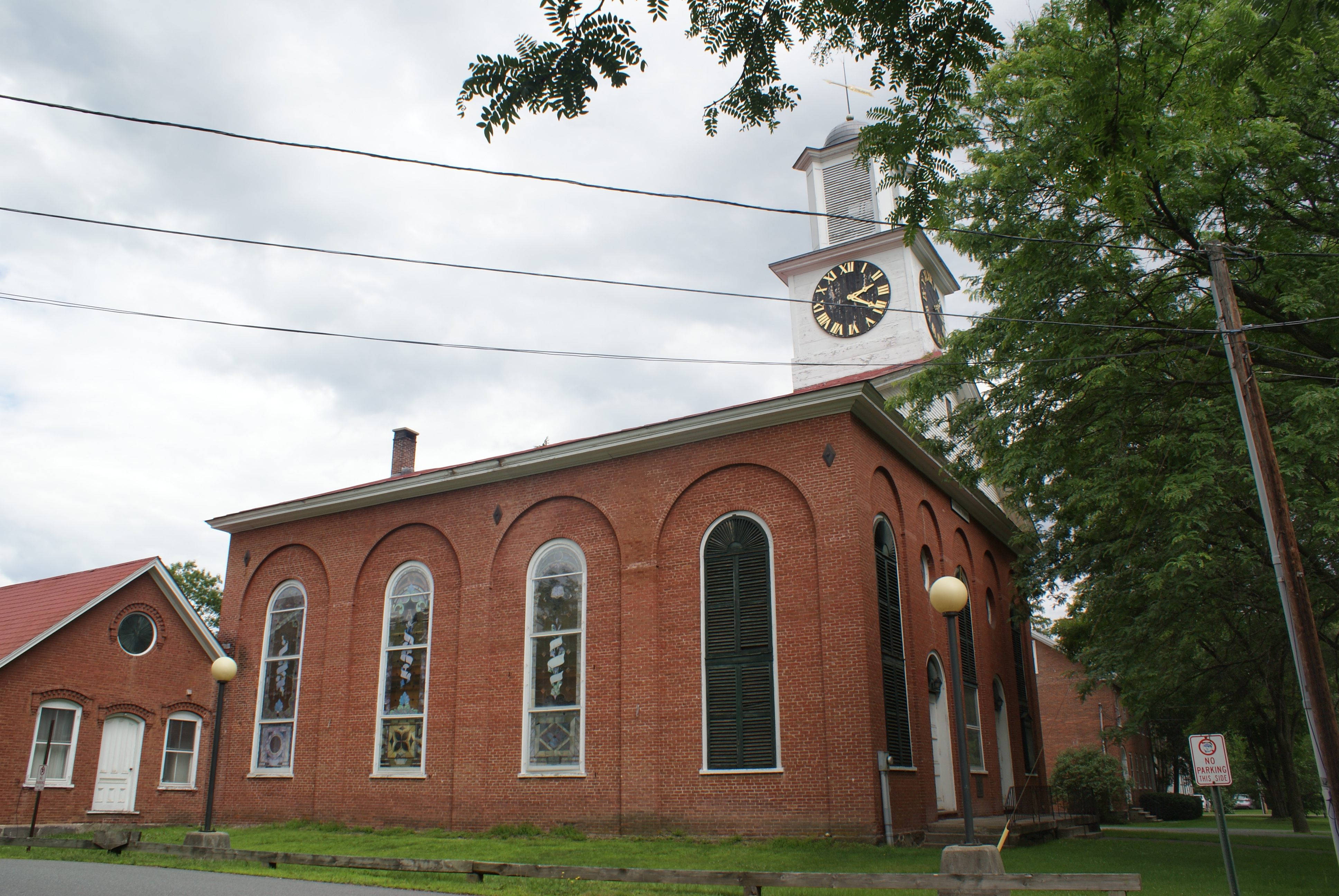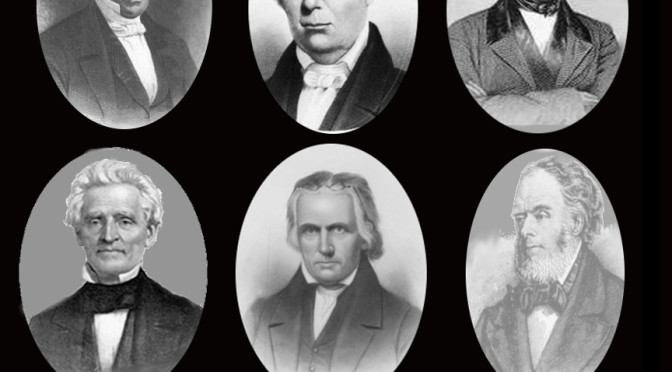If you read the other posts this week, you’ll know more about Abner Jones than 99.9999% of the people in the world. But, if all those footnotes scared you away, today’s post will hopefully make things a bit easier.
What you see below is the text of a lecture given by Bradley Cobb on the life and work of Abner Jones. The focus in the first section is on how he was never at peace until he actually obeyed the gospel. If you’d rather just listen to the lecture, then just click here and select the Abner Jones lesson.
This will also be included in the upcoming book, Abner Jones: A Collection (Volume 2).
Introduction:
Abner Jones is not a familiar name to most people. And even for those who are somewhat familiar with the Restoration Movement, he is usually nothing more than a name to them. We think about Barton W. Stone, Alexander Campbell, and others, but Abner Jones is usually only given a passing notice—perhaps a sentence or two, if anything at all. Today, we will try to remedy that. Obviously, there’s no way of covering everything he ever did, but we’ll look at his life and see the things that he did to help restore New Testament Christianity.
One thing that I want to make very clear—Abner Jones was working to restore New Testament Christianity almost a decade before Alexander Campbell ever set foot on American soil.
Birth and early life:
Abner Jones was born in 1772, four years before the Declaration of Independence was signed. Both of his parents were hard-core Calvinist Baptists. In fact, his father was a Baptist preacher. Needless to say, the idea of religion and eternal torment was pressed into Abner’s head from a very early age.
When he was eight years old, in the middle of winter, their family moved to Bridgewater, Vermont, which was basically a wilderness. The closest neighbor was around two miles away. They built a house completely out of logs. And in his autobiography, he makes it very clear that there were no planks, no windows, nothing except for logs stacked on each other. One side of their new home was left open, and they had a continual fire going throughout the winter.
Throughout much of his early life—even up into his 20s—Abner suffered from depression. This was not a clinical depression or some chemical imbalance, but instead it was an immense depression brought on by the thought that he might not be one of the “elect”, and that he might burn forever in hell. Calvinist doctrine teaches that man has no control over his destiny—that God determined whether you are going to heaven or hell before you were even born, and that you have no choice in the matter. Even before he turned ten years old, Abner said that he was fully convinced that he must be born again or be damned. He desperately wanted it, but his Calvinistic Baptist upbringing warred in his mind, telling him that it didn’t matter how much he wanted it—if God planned to send him to hell, that’s what would happen. Because of this, his depression continued—feeling as though life was pointless unless God had chosen you to salvation. And with that depression, Abner was more and more convinced that God hadn’t chosen him.
When he was ten years old, he went to a meeting (having prayed his usual prayer for God to have mercy upon him), and the message he heard made him feel alive inside. For a time, he took this to mean that God had saved him, that God had made him alive. But the feeling went away, leaving Abner more depressed than before. He did not then realize it, but his feeling of joy came when he first believed in Christ.
Because of his uncertainty about this experience, he determined to keep it to himself. However, he made the mistake of telling his mother’s nosey friend that he had a secret, and she hounded him until he told her. However, after making his confession of faith, he again had a feeling of joy. But, as he did not continue on the path to salvation, his joy subsided once more.
He admits in his autobiography that he felt the need for baptism pressing upon him, but he continually rejected it—likely owing to the teaching of his parents that baptism is of no importance. As he fought against being baptized, his depression grew more and more. One day he went to his mother and told her “I am going straight to hell.” Her response was that it was still possible that he was one of the elect. This caused even more depression, because as bad as Abner wanted to go to heaven, he felt he had no power to do anything about it.
For the next six years, he did everything he could to embrace universalism (the belief that everyone will go to heaven, regardless of how they live their lives). He went to dances (which he admits he knew was wrong), and spent his time with those who didn’t have any care for religion at all. But still there was a sorrow, a deep longing for heaven—and a depression because he had resigned himself to never being able to get there. And within there was also a fear of what his friends would say if he suddenly “got religion.”
It was during these years that he had a series of events happen that he describes as God’s judgments against him—judgments because he refused to be baptized. He got sick of fever so bad that he lost his apprenticeship in one place. While chopping wood, once, he missed and implanted the axe into his foot. During another incident when he was fighting even harder against God, he suffered a massive hernia that was never able to be completely fixed. From that point onward, he was unable to do any real physical labor.
Finding Religion
He went back home to Vermont, and there was quite the revival going on there. Abner felt ashamed of the life he’d been living, but still did nothing about it. His pride kept him from being able to publicly admit the need for salvation. Months went by, and finally he repented of his sins and determined to follow God. He began to pray a couple times at some Baptist meetings, but had not yet been baptized. He felt an intense inner feeling that he would someday have to preach.
It was upon reading his Bible and finally admitting to himself that baptism was a requirement of God for salvation that he finally submitted to the divine ordinance, in 1793. For months afterwards, Abner would occasionally preach the Calvinistic doctrines that he was raised with—but this didn’t last very long, because he was studying his Bible. He realized very quickly that the Calvinistic ideas of “predestination” and “election” were foreign to the Bible, and he rejected them.
It was shortly after this that he came to the realization that the name “Baptist” was never applied to the church in the Scriptures, and he rejected that as well. From that point on (1794), he determined only to use the name “Christian.” In his studies, he also realized the entire Baptist organization was unscriptural: the way one becomes a member of the Baptist Church, their confessions of faith, and their leadership councils. So he rejected all of them.
It was around this time that he got married and went into the practice of “physic” (he became a physic-ian). He began to build up some wealth with his medical practice, but he continued to feel the pressing urge: I need to preach. Eventually he completely gave up his medical practice.
The Christian Connexion
He went about preaching wherever he had the opportunity, calling people to follow only what the Bible says and nothing more. At this point, he was still aligned with the Baptist Church—though he expressly stated that he would not abide by any of their unscriptural doctrines or practices. In 1801, after ruffling many feathers in the Baptist Church, he planted a congregation of about 25 people, and they went by the name “Christians.” Later, Elias Smith joined forces with him, and they spread the wonderful news about the ability to become “Christians only.” These congregations were loosely joined together (like churches of Christ today), and as a whole, they were called “the Christian Connexion.” In 1802, A group of like-minded brethren came to him with an offer: We believe God has called you to preach, and so we are going to make sure your family is financially supported so that you can go about preaching wherever you feel God wants you to preach. Abner took this as a sign from God that preaching was what he was meant for.
Because he preached heavily against Calvinism, the Free-Will Baptists endorsed him, and even ordained him—though he refused to wear the name Baptist or to be associated with any of their confessions and practices that couldn’t be found in the Bible.
In 1804, and in the years following, Abner wrote and published quite a few hymnals—some of them with Elias Smith.
In 1805, some of the congregations gathered together and had a conference where they drew up articles of faith—old habits die hard. However, they quickly realized what they were doing, and “agreed that their articles were useless, and so they abandoned them, taking on the New Testament” as their guide.
Abner was content to let Elias Smith be the visible face in spreading the message of the Christian Connexion. Meanwhile, he was going around to churches, strengthening them and encouraging them. And these congregations grew, which Abner believed was God’s sign that he was doing the right thing.
He caused quite an uproar when he began preaching against drinking alcohol in any amount—but he held his ground. He also came under fire at one point because he joined the Freemasons. Because of the outrage of a few, he resigned his membership with that group, believing that Christian Unity was far more important than belonging to any social club.
The Decline
When Elias Smith drifted into universalism and basically left the Christian Connexion for a time, it dealt a staggering blow to the congregations—and to Abner. He went about trying to keep encouraging the members, but the one who had been their unofficial leader had abandoned the cause—and the people became quite disheartened. Abner Jones did not know what to make of this, because if growing congregations were a sign of God’s being pleased with him, what did it mean when the congregations were shrinking?
Because of an outbreak of disease, he again took up his medical practice while working with the congregation in Hopkinton. After six years’ work there, he returned to Salem—only to find a congregation in ruins, having turned completely to emotion as their guide. It took seven years, but Abner rebuilt the congregation. Meanwhile, the Hopkinton congregation had merged with the Baptists.
By the 1830s, the Christian Connexion was having annual conferences (the first one was convened to discuss how to deal with the fallout from Elias Smith’s departure), and was showing the signs of drifting into denominationalism. Many of the congregations were being led by people who were Unitarians (denied the three-fold nature of the Godhead—Father, Son, and Holy Spirit). Jones’ own son identified himself as a “Unitarian minister.” Another thing that was taking place in a couple of the Connexion congregations was that women were being allowed to preach. This was not widespread, and there is nothing to suggest that Abner Jones condoned or accepted it, but it was happening.
Perhaps the final death knoll came when a man named William Miller—a charismatic man—famously predicted the coming of Christ would take place on a specific date in 1843. By 1839, he had taken in close to half of the Connexion members with his lies. The other half was derided as being “faithfless” for not believing him.
The former leaders in the Connexion were gone. Elias Smith was no longer among their number. Abner Jones was approaching 70 and was “well stricken in years.” Daniel Hix, preacher for one of the largest congregations in the movement, had died the year before. And without strong leadership in the congregations, they became ripe for the plucking.
When William Miller’s date came and went in 1843, he announced a miscalculation and said it should be 1844 instead. Undaunted, those who followed him were even more determined than ever. When the date came and went (an event, which by the way is known historically as “the Great Disappointment”), many of those who were taken in by his lies were too ashamed to go back to the brethren they had made fun of previously. The Connexion suffered an irreparable split. Those who bought into Miller’s lies were too ashamed to face the ones who knew better. The ones who knew better decided they couldn’t put their trust in those who were so easily led astray. Ultimately, the Christian Connextion split into two separate bodies. One of them joined forces with other “Christian Churches” (like those led by Alexander Campbell or Barton W. Stone) or “churches of Christ” (back then, they went by both names). The other group stayed independent and called itself “The Christian Church” (not to be confused with the group today called the Christian Church). This group later joined with the “Congregationalists Churches,” and that group has come to be known as the United Churches of Christ.
Thankfully, Abner did not have to live to see the day when close to half of the people that he had worked so hard to teach the true gospel would fall away. He passed away in 1841.
The Christian Connexion (and Abner Jones) have been claimed as part of the history of multiple religious groups including the Seventh-Day Adventists (one of William Miller’s followers started that group), the Mormons (who claimed his restoration movement was to prepare the way for Joseph Smith in New England), and even the Jehovah’s Witnesses (because a hymn book by a different man named Abner Jones used the name “Jehovah” repeatedly).
Throughout his life, Abner Jones’ main desire was to simply be a Christian and to go to heaven.




